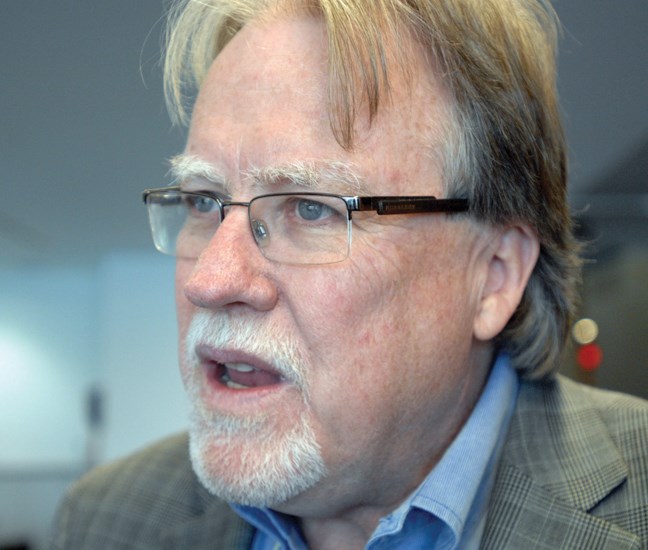Jim Sinclair doesn't have a problem with a Chinese company and its plan to dig an exploratory coal mine in the Murray River area southwest of Tumbler Ridge.
What bothers the president of the B.C. Federation of Labour president is that HD Mining plans to import 200 Chinese workers. They will be working on what's expected to be a six-to-eight-month project to extract a 100,000-tonne coal sample to determine if a long-term mine is viable.
Sinclair wants the B.C. government to suspend the temporary foreign worker permits the company will need to construct a longwall mine and should instead look for ways to train Canadians to work in the mine.
"I think we know enough information to realize there's something really wrong with this picture," said Sinclair. "As the Northern Miner [magazine] pointed out, it's probably the worst thing you could do for economic return. You have a Chinese company come and they invest. Then they take out the coal to China and manufacture there. Then they take the profits to China and now we're going to bring the workers and they will take the paycheques home.
"We need the mine, we just need to do it in an economic way that benefits British Columbians, and this way doesn't. We're asking that the government take some action here. We want [Prince George-Mackenzie MLA] Pat Bell to say to the federal counterpart, 'Let's lift the permit until we investigate all these problems.'"
Sinclair thinks Canadians could be trained to work in the mine at postsecondary schools like the College of New Caledonia. While he admits longwall mining, which involves a single-slice approach along the entire length of the coal seam, will require specific skills and mining specialists who have worked on similar projects, he said the vast majority of workers could be trained quickly.
But Bell, the Minister of Jobs, Tourism and Skills Training, said there are no longwall mines in Canada and no places to train workers. He said it doesn't make sense to invest in three or four years of training workers for short-term jobs where there are no guarantees of permanent employment.
"What Mr. Sinclair is asking is for us to say no to the 1,300 jobs that would come if this mine actually does go forward," said Bell. "This is an exploration project and there's not a facility that could be used to train for this specific skill set because there are in mines of this nature anywhere in Canada.
"This is a six-to-eight month job and if there was anyone available to do a job of this nature they would have self-identified if they were unemployed and clearly that's not the case. There are about 290 British Columbians relying on this project right now for jobs. These 201 Chinese that are coming in have specific skills for the underground workings but the above-ground jobs that pertain to the development, design and environmental aspects are all held by British Columbians."
If the exploration results are favourable and HD Mining goes ahead with a full-scale mine, it would have to pass an environmental assessment. Construction would begin in 2015.
According to Sinclair, 300 Canadians applied for jobs in the mine, 100 of them got interviews, and not one of them has been hired. The company is required to show to federal and provincial authorities that there are aren't domestic workers qualified for that kind of work. The temporary foreign worker program allows workers to stay up to four years, after which they have to leave the country unless they have landed immigrant status.
"This program is set up for cheap labour, to undercut labour and undercut Canadian workers at this mine," Sinclair said.
"We've seen the influx of temporary foreign workers at all levels, both skilled and unskilled, just balloon in the last three or four years. There are more people coming now in the temporary foreign worker program than there are landed immigrants and that's wrong. You don't get to build the country if you're a temporary foreign worker.
"If we have a shortage of miners in British Columbia, then we can bring miners from other parts of the world to work there, but they should be landed immigrants who have a right to stay, and right to say no to the company if it's unsafe."
Since 2000, 50,000 workers have died while working in China's mines and Sinclair points to country's dubious safety record in mining operations as a cause for alarm. The coal seams of the Murray River mine are located between 500 and 1,000 vertical metres below the surface and the company anticipates the area to be explored will contain pockets of explosive methane gas, which will require construction of a large-diameter vertical shaft to vent the gas.
"They've killed 50,000 miners in China in the last decade," Sinclair said. "They have the worst record on the planet. It's obvious in China the standards are different. We haven't killed very many miners at all, we have a high standard of safety and we enforce that standard. But if nobody in that mine knows that, and no one in that mine can speak English, it's hard to enforce any standards."
Sinclair toured the new trades building Friday at CNC and will be in Prince George to speak today to the North Central Labour Council.



